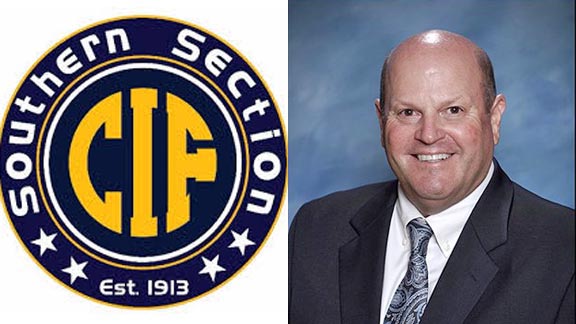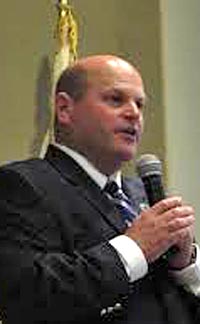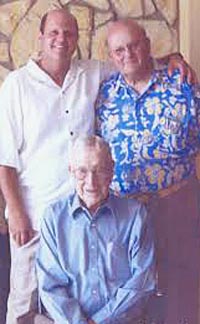
Rob Wigod has been the commissioner of the CIF Southern Section for nine years. He is from Wilson High (Long Beach) and graduated from Long Beach State. Photo: CIF Southern Section.
Entering a summer unlike any other in his nine previous years as the commissioner of the CIF Southern Section (one of the largest high school sports organizations in the nation), we went over a myriad of topics during a Monday afternoon discussion. He talked about the opening of the 2020-21 school year, the start of the section’s new and latest version of competitive equity section football playoffs and possible changes to that system moving forward (including at the very top).
NOTE: We hope you enjoy this free post on CalHiSports.com. To get new State Top 65 all-time greatest team football rankings (released two weeks ago), all-time state record updates in five sports and more, please consider becoming a Gold Club member today. Rates are as low as 6.8 cents per day. For details, CLICK HERE.
Rob’s car wash added another stop on Monday as CIF Southern Section commissioner Rob Wigod pulled into the Cal-Hi Sports stall where he spent a good 45 minutes of his time looking to add some polish to the section’s upcoming new, revamped football playoffs. He also provided more clarity to the likely re-opening of schools and sports in the fall.
Through longtime CIFSS associate commissioner and media relations director Thom Simmons, Wigod has been doing a series of media interviews in the last two weeks. It’s not quite the same as a movie star promoting a new film through a series of stops at various studios at ESPN headquarters in Bristol, Conn., (known as a car wash), but it’s the same concept. Some of Wigod’s interviews have been on Zoom calls, but we’re a bit more old-fashioned and are presenting his interview with Cal-Hi Sports as a Q&A.

Wigod is often asked by other state associations to advise them about competitive equity. Photo: CIF Southern Section.
We’ve known Rob ever since he began at the CIFSS office as an assistant commissioner 20 years ago, especially since he was often involved in the early years of the CIF state football bowl games in the middle of the 2000s. Since then, he’s become one of the leaders of education-based athletics not just in California but for the nation. He might joke about it now, but he’ll be considered one of the founders of competitive equity-based playoff divisions and its strongest proponent probably long after he’s retired.
Speaking of retirements, Wigod has quickly become one of the longest-serving CIF section commissioners in the state. In just the last two years, six of the section commissioners have retired. This year, the list includes Jerry Schneipp (San Diego), Duane Morgan (Central Coast) and Jim Crichlow (Central). The four holdovers are Wigod, Mike Garrison (Sac-Joaquin), Liz Kyle (Northern) and Don Collins (San Francisco).
The 2019-20 school year will forever be known as the one that was halted in March, just two days before the CIF state basketball championships were supposed to start, by the outbreak of the Coronavirus pandemic. As this interview was conducted, the school year is just about considered officially done with everyone in high school athletics focused on all of the possibilities for what might happen for 2020-21.
Q: Thanks for the time. We don’t want to go over as much that’s already been covered in previous interviews, but it’s kind of like one of those car washes we recall from our years at ESPN. How has it been going?
A: Obviously, we’re trying hard to stay connected to as many people as possible. Some don’t have specific questions and are more general but we wanted to set aside some time for everyone who wanted to talk.
Q: So is there anything new to add from any of the comments that you made last week?
A: We want everyone to know that all options are on the table. We are doing our best to stay connected to all of the school districts. No one is looking to set aside high school sports for the upcoming school year. We want to keep it alive, keep it viable.
Q: You’ve said it’s going to be a school district-by-school district approach toward fall sports taking place. Are there any specific school districts we should look for as bellweathers? We’re thinking of how the Hart High School District was perhaps the first to shut down spring sports and then it turned out that everyone else followed.
A: We are tracking every one of them (of the school districts). We had already developed a spread sheet when the schools first began to shut down. If you remember, a lot of them were going to come back on April 10 or April 20 or whenever. It was changing all the time. What we are now hearing from every school district is that they are all holding to their start dates (in August). We’re not sure what that means for sports yet, but it’s not like the spring.
It’s not just the school districts. We had a great call last week with the Riverside County (Office of Education) in which all of the district superintendents were there. It’s going to be a very comprehensive process about re-opening.
Q: You have a background at Long Beach Wilson and the Moore League (Wigod was a teacher and coach at Lakewood for 14 years before coming to the CIFSS office). Often in those years, we’d see a team like Long Beach Poly in football win the league and be competitive in the top division of the playoffs but only to see the second and third place teams really struggle in the same division. How has your background influenced your great support of the competitive equity playoff system?
A: Absolutely, that background has shaped my thoughts on competitive equity. We already knew that a lot of teams from the same league being in the same division wasn’t fair. Some of those Moore League teams were immediately thrown into very tough playoff situations.
Then when I went to the CIFSS office it gave me the ability to see that the same thing was happening in many other places. We were seeing mismatches in many sports. We started thinking to ourselves ‘There’s got to be a better way.’
Q: This season, the new CIFSS playoff divisions in football will no longer use pre-determined divisions and instead will go with competitive-equity seedings based on computer power rankings. How pleased were you that the recent vote of your schools was so strong (more than 90 percent in favor)?
A: This is the fourth year we’ve had it in football and we always knew it would have to eventually go to current season results. We found out we could get the data to do that. It’s a natural evolution and the schools wanted it.

Wigod is shown with legendary UCLA basketball coach John Wooden and his father, Dr. Richard Wigod. Photo: CIF Southern Section.
Q: Is it fair to say that schools like Corona del Mar (D1-A), Pacifica of Oxnard (D2-A) and El Monte (D-5AA) may not have won CIF state football titles last year using this same system?
A: Corona del Mar was outstanding, but would have been in the top eight for Division 1 using this same system (same division as St. John Bosco and Mater Dei). I’m not sure about the others. There are good and bad things you can point to for certain schools, but a lot of schools are now having football playoff experiences that they’ve never had. We wanted it to be accurate. Corona del Mar would have been in the top eight last year, but going by the old system would have stayed there (this season). With so many new players and so many that graduated, that’s a team that with the new system won’t have to stay there. This new way also will account for a school that may have gotten a lot of new players. That school will rise up into a division it should be in.
The key is to get accurate data and that’s easiest to do in football, which has the fewest number of games. We’ve sort of pioneered this way of doing playoffs. A lot of times we’re working with some other sections, like San Diego, and the CIF state office has been very much in favor of this. In 10 of our 13 title games in football, the winning margin was seven points or less.
Q: When we talk to small schools around the state, they are quite concerned about competitive equity because they don’t think it’s fair for their teams to be facing schools six or seven times larger or even more. You didn’t have any champions last year what would be considered small schools, even South Torrance in D13. Could there be the possibility of adding some kind of small schools division at the bottom of your brackets that might be good for schools like St. Pius X-St. Matthias, Ontario Christian, Rio Hondo Prep, Pasadena Poly, Fillmore and others?
A: I understand that. Some of the small schools do feel overmatched. But we also have seen they’re in competitive games. We want to keep looking for ways to help them. But you can’t just make it a division for smaller schools just based on enrollment, either. Sierra Canyon only has 400 students and they wouldn’t belong in such a division. You mentioned South Torrance for D13, but they’re going to move up next season. I think the new system should help and will put them in the right group.
Q: Another criticism of competitive-equity divisions is sort of the magic line of where it comes into any of the brackets and sometimes that line falls in a spot that just doesn’t make sense. You may have seen in the CIF Central Coast Section (which went to competitive equity brackets last year like you are doing this year) that small school Half Moon Bay had to play Serra of San Mateo in the first round of its top division. It easily could have been adjusted by flipping two 8,9 teams so that Half Moon Bay was top seed in D2 and Los Gatos was the No. 8 for D1. And then in your own section last season in girls volleyball you had a championship team from Esperanza of Anaheim having to go on the road in the SoCal regional playoffs as a No. 16 seed in D1 to play at Sierra Canyon while the team it just beat (Murrieta Valley) got the top seed in D2. Can’t there be a way to avoid those types of situations?
A: When it comes to state regionals, we have no input on which divisions teams are placed. We give them the teams to place and we make sure to always have the champion ahead of the runner-up. Where they draw those lines is up to them. In football, it’s going to be the top eight teams in Division I by the rankings. The coaches and schools all know that we could have a second-place team from a league higher than the first-place team. We don’t know if a head-to-head result like you describe would change the order or not. We will see. For the other divisions, we’ll have 13 automatic qualifiers and those 13 will be ranked 1 to 13 and then the other three teams will be at-large. I can’t answer for what might have happened in another section.
Q: You also have a competitive equity issue at the very top of your football playoffs. This is of course St. John Bosco and Mater Dei and it seems to us that there’s not much that can be done. But is there something to be done, like in the NCS (CIF North Coast Section), which has a four-team Open Division?
A: I don’t want to speculate about the top two teams, but will say this: you can’t believe in competitive equity if you don’t believe it in all examples. We had one very competitive game last year (in the top division) with Servite and Mission Viejo, but even the semifinals weren’t. We just had one year, though, and we’ll look at the results of these games next year. We should do something if teams are losing by 40 points.
Q: You had to have noticed that the NCS also is going to a new format in which the losing team in its Open Division would drop down and play in a different game so it could still have a chance to win a state title. Going to something like that in your section would just create a second team dominating in a different division, but what was your reaction?
A: I do see that it’s a different situation (in the NCS) with one team (De La Salle) winning year after year. We have two and they play each other in the same league and more often than not they are splitting in their games. I wonder how that would play out if there’s a championship game and at halftime one of the teams is in a tough spot? That team might think about not everyone playing in the second half. Are you going to have your best game when you know it doesn’t matter if you win or lose?
Thanks again to the commissioner for giving us the time. We all just want to return to a version of high school sports we can recognize.
Mark Tennis is the co-founder and publisher of CalHiSports.com. He can be reached at markjtennis@gmail.com. Don’t forget to follow Mark on the Cal-Hi Sports Twitter handle:




3 Comments
Dear Rob Wigod,
I wanted to voice my opinion in regards to the New CIF Playoff Format. I understand that the reason for the new format is to create more parity in the playoffs. However, I believe it would make more sense to expand the D1 bracket to 14 teams and D2 to 14 teams. This way you don’t have perennial powerhouse D1 teams playing a D2 team that may have been a D3 team going into
the season, but because they have a great year and say they win their league they get moved up a division and have to play a D1 powerhouse in the first round.
I believe it would make more sense to expand the D1 bracket to 14 teams, and all the teams that are league champions should be rewarded for a great season by automatically getting a first round home game.
The perfect example was last nights game between Bishop Amat and Yorba Linda. You have a perennial D1 powerhouse that cane in second place in their league, and paired them against a D3 school that goes undefeated wins their league and has to go play on the road. This makes no sense at all, and your committee should look into this new process of seeding teams to reward the teams that have won their league championship and give them an automatic first round home game.
Best Regards,
Robert
Same letter applies to Simi Valley for sure and perhaps Warren to a lesser extent.
Also can see CIFSS D2 becoming a place for the very good private school teams that have no chance vs MD or Bosco to win titles most of the time.
Mater Dai football staff and office administration needs to be investigated . This school is sicken they prefer a win over human life . The victim is affected for life because this school failed him .